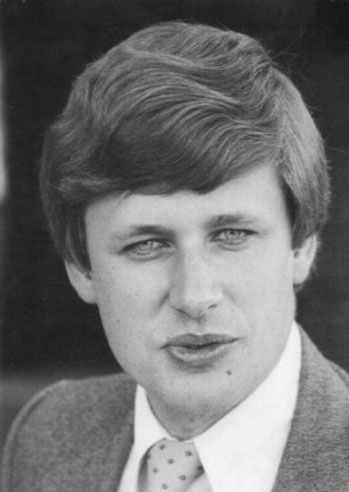Will Canada be in a black hole no matter what happens on May 2?
Apr 20th, 2011 | By Counterweights Editors | Category: In Brief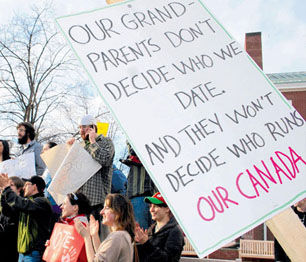
AÂ so-called vote mob was held at St. Francis Xavier University on Tuesday, April 19, before an all-candidates debate to encourage youth voting. (AARON BESWICK / Halifax Chronicle Herald).
The Canadian federal election of 2011 started with a lot of wild talk about reckless coalitions. And with a mere 11 days to go now, it’s starting to seem as if that’s how it may end too.
It may or may not be a good sign that the imagery has developed somewhat over the past few weeks. Today in Rivière-du-Loup, on the south shore of the ancient St. Lawrence “River of Canada,” east of Québec City, on the way to the Gaspé, Stephen Harper was asked what would happen if he “doesn’t get the majority government outcome that he is shooting for and says is necessary to keep the country on the right economic path.”
He answered that the “country will be headed into a ‘black hole’ led by the Liberals, NDP and Bloc Quebecois.” More exactly: “‘We don’t know what will happen in such a circumstance,’ the Conservative party leader said.” But “the only way to avoid uncertainty is to give his party a majority of seats” in the Canadian House of Commons.
What will happen if the Canadian people do not quite do as they’re told, and give the Harper Conservatives something slightly less than a bare majority in the new 41st Parliament? (And this does seem the outcome now suggested by the ubiquitous opinion polls: see, eg, the current predictions of ThreeHundredEight.com and Canadian Election Watch.)
More exactly again, if leader of a third minority government proved to be his fate, would Mr. Harper “be willing to tone down his agenda so that it was acceptable to other parties”? His current response to this query: “‘I don’t accept that question,’ he told reporters.”
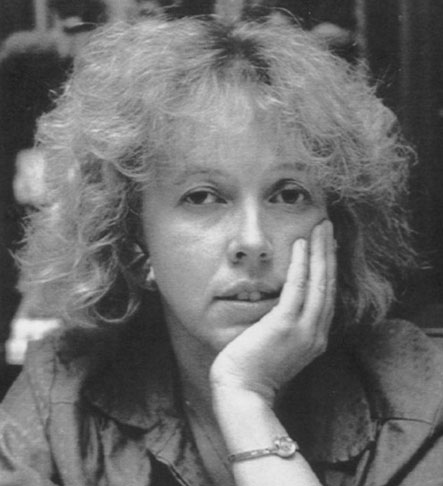
Elizabeth May in 1988, shortly after she resigned as senior policy advisor to federal Environment Minister Tom MacMillan, in Brian Mulroney’s Conservative government. Greg Teckles/Toronto Star.
And this logically enough leads to the prospect that a third Harper minority government “could be defeated and the second place party asked to form a government.” Which, in Mr. Harper’s mind at least, in turn leads to the “‘black hole’ led by the Liberals, NDP and Bloc Quebecois.”
At this stage of the often troubling 2011 election campaign other minds might be starting to see some form of black hole, no matter what the outcome of the actual vote on Monday, May 2.
To start with, the kind of final numbers that might actually lead to some Liberal minority alternative to a Conservative minority, supported by the NDP and even the Bloc, currently seem the least likely outcome of the election.
* * * *

Gilles Duceppe in 1990, running for election in the Montreal riding of Laurier Ste-Marie for the Bloc Quebecois. Canadian Press.
Several days ago now, eg, Bryan Breguet concocted an at least somewhat conceivable model of this sort, in which the Conservatives take 126 seats, the Liberals 112, the New Democrats 27, and the Bloc Quebecois 43. But his current April 20 seat projection gives the Conservatives 146 seats, the Liberals 76, the New Democrats 41, and the Bloc 45. (And this allocation reflects the NDP’s surprisingly strong showing in Quebec in the most recent past.)
In a similar spirit, ThreeHundredEight.com is currently predicting 147 Conservative seats, compared with 80 for the Liberals, 35 for the NDP, and 45 for the Bloc. Canadian Election Watch is predicting 150 seats for the Conservatives, 75 for the Liberals, 36 for the NDP, 46 for the Bloc, and 1 Independent.
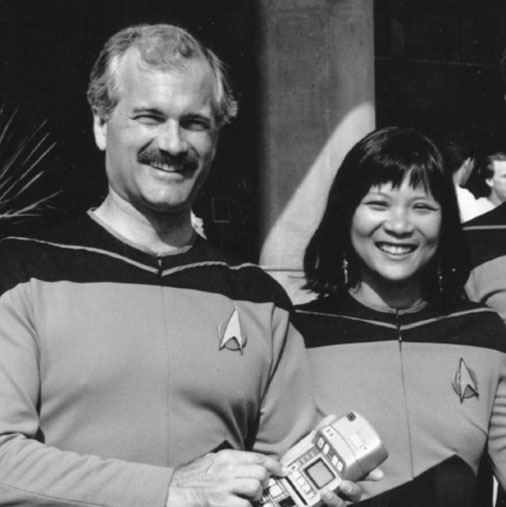
Jack Layton with wife, Olivia Chow, in 1991. Layton was running for mayor of Toronto when this sci-fi-themed photo was taken near city hall. Toronto Star.
The Conservatives won 143 seats in 2008. On any scenario where they win more than this – but still less than the 155 seats required for a bare majority in a 308 member House – we are quite arguably into another kind of quite serious black hole. On the one hand, the Liberals have too few seats relative to the Conservatives to form a credible alternative minority government. At the same time, Mr. Harper will feel that he has won enough seats, just short of a majority, to insist that the opposition majority must follow his lead (or “mandate” as he quite misleadingly likes to say). If the majority is not prepared to do this (and why would they?), we will have a recipe for extended governmental gridlock in Ottawa. And who knows just where that might lead?
Finally, suppose enough of the Canadian people do take Mr. Harper’s advice and give him at least a bare majority of 155 seats or more in the Canadian House of Commons. There is nothing in the current polling data to suggest that he will have performed this feat with anything like 50% of the cross-Canada popular vote. But there is much in the past five or so years to suggest that Mr. Harper would use his majority of seats in Parliament to try twisting Canada’s political culture in various directions in which some 60% of the Canadian people just do not want to go.
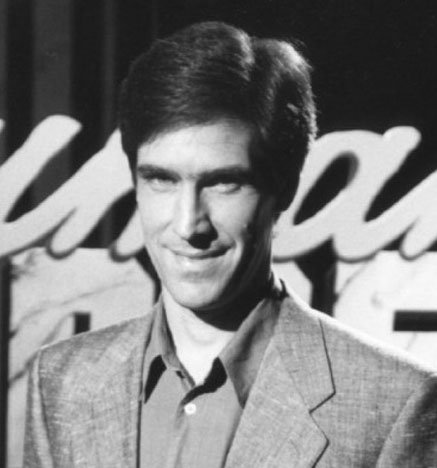
Michael Ignatieff in 1989, on the set of the TV Ontario documentary series "Human Edge," which he hosted. Toronto Star.
The ultimate result here will be four long years of a very divided and divisive Canadian body politic – another kind of black hole whose ultimate consequences remain quite unknown (and certainly seem to us quite unlikely to be even remotely benign). This is the dark forest to the edge of which minority PM Stephen Harper has already led us.
Dan Leger at the Halifax Chronicle Herald has also already given us an all-too-bleak assessment of the early dimensions of this particular black hole: “In 2011, demonization has replaced debate and attack ads trump discussion. And we, all of us, let it happen … Political toxicity has infected the national psyche. It’s why people don’t want to vote and it’s why the Conservatives will do very well on May 2. In a turned-off electorate, the advantage goes to the party whose adherents are most hard-core, no matter how disturbing its message.”
We will be happy indeed if the final results on May 2, 2011 prove this particular assessment just a little too bleak. And until the worst does happen, we will continue to hold out hope for something better.
But as the clock winds down, it gets harder and harder to hold out too much hope for a Canadian mid-term future that does not involve some kind of black hole, one way or another. This is no doubt not all Mr. Harper’s fault. As Dan Leger says: “we, all of us, let it happen.” The only good thing may be that, at some point soon enough, we all of us will have to start repairing the damage – and cutting some new path out of whichever black hole we find ourselves in at last.
